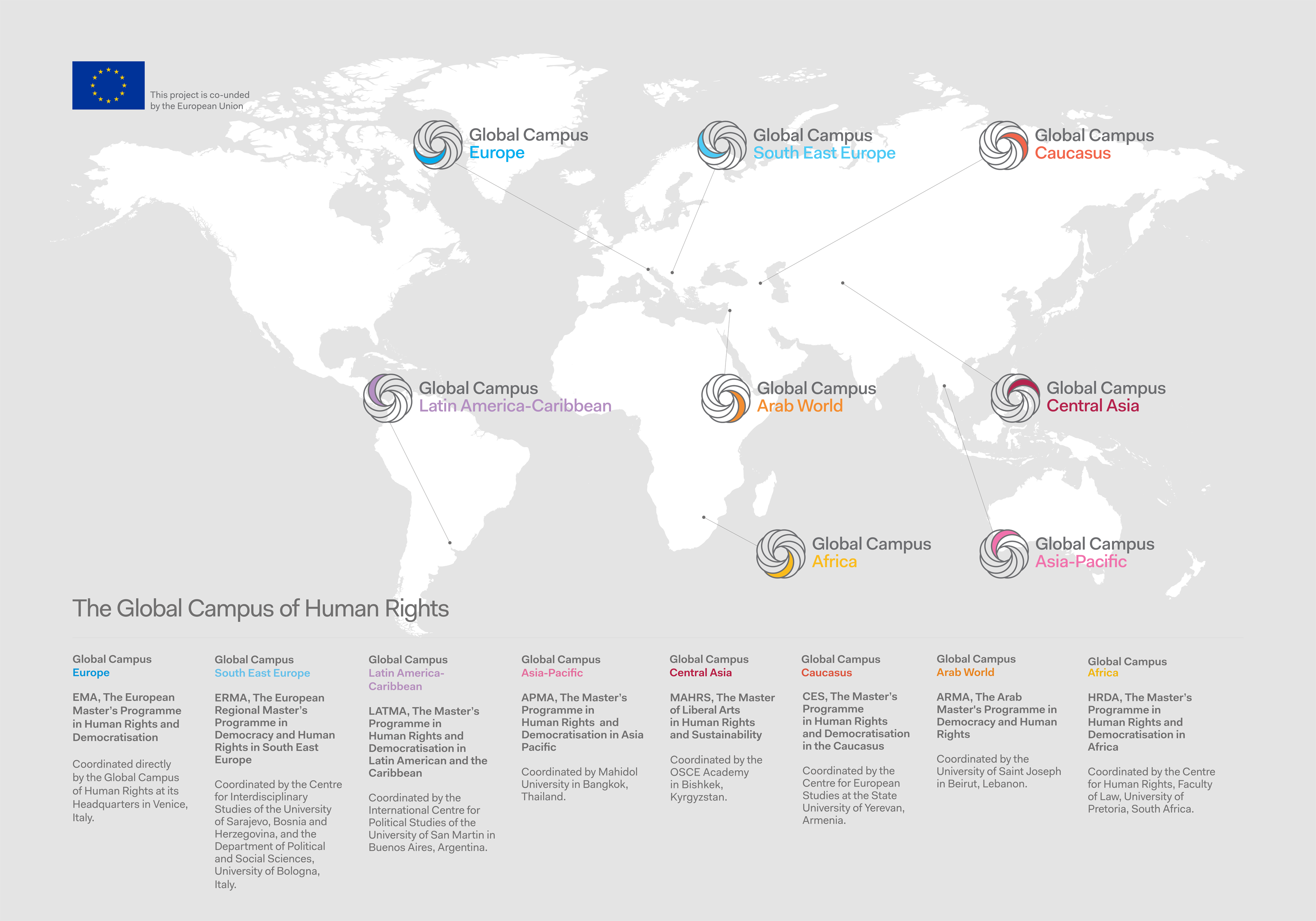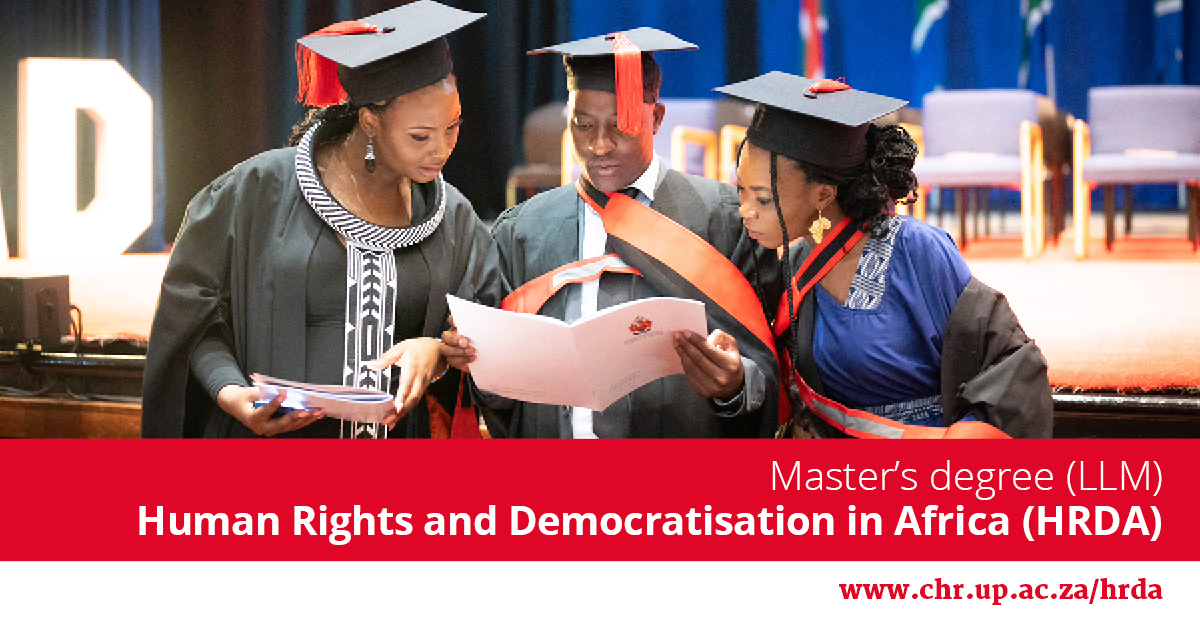 About the programme
About the programme
The LLM in Human Rights and Democratisation in Africa (HRDA) is a prestigious one-year intensive course where 25-30 exceptional individuals spend six months in Pretoria and six months at one of the 12 partner universities all over Africa. They are taught by eminent lecturers in the field of human rights and undergo many practical training exercises. It is the only course of its kind in Africa. Graduates become members of the HRDA Alumni Association whose 663 members are currently active in the full spectrum of human rights work: from grassroots, through civil service, to international organisations including the African Union and the United Nations. Individuals from all African countries are invited to apply for admission to study for the Master’s degree (LLM) in Human Rights and Democratisation in Africa at the Centre for Human Rights, University of Pretoria, South Africa.
Application deadline
The deadline for applications is 31 July 2025
Objectives
The objectives of the LLM programme are:
-
To train human rights experts who can be employed in government ministries, and other national, international and regional bodies concerned with human rights and democracy. The aim is to ensure the effectiveness of these bodies, through imparting professionalism and operational competence. The end result is to ensure the transfer of technical skills and strengthen the capacity of these organisations with the goal of improving the protection and promotion of human rights and democratisation in Africa.
-
Expand collaboration among African universities. Collaboration should result in a network of lawyers and academics specialised in human rights and democracy. The programme envisages promoting research and teaching that addresses the particular needs of Africa. Some identified needs include conflict prevention; democratic transition; strengthening of civil society, institutional building and the rule of law. The programme also aims at developing and strengthening links between civil society, governmental bodies, and international organisations.
-
Develop a relationship between the African Masters and the other regional masters, such as the European Masters Degree in Human Rights and Democratisation (EMA), the Master’s Degree in Human Rights and Democratisation in South Eastern Europe and the Mediterranean Master’s Programme in Human Rights and Democratisation.
Course details
This premier course, the only one of its kind, focuses specifically on human rights as seen from the African perspective. The course is presented full-time over one academic year (two semesters) that runs from the end of January to early December and comprises eight modules.
Instruction is by way of formal lectures and practical activities. The lecturers are some of the most prominent human rights experts in the world. Emphasis is placed on classroom participation and there is ample opportunity for informal interaction between the students and lecturers. Students can make use of extensive library facilities.
A substantial part of the course is dedicated to the use of the Internet in research on human rights law. The medium of instruction is English, of which students must have good working knowledge in order to follow lectures and participate fully in class discussions and practical exercises. Students who did not undertake their undergraduate studies in English are required to write the Test of English as a Foreign Language (TOEFL). Upon admission to the programme advanced English is provided for students from non-English speaking countries and French is taught to students from English speaking countries. Students who are fluent in both English and French study another language such as Arabic, Portuguese, admission is on a competitive basis and bursaries are available.
Scholarships
A limited number of up to 30 students are selected per year. Depending on the availability of funding, full-scholarships covering at least tuition, accommodation and official programme activities are covered for up to 25 citizens of Africa. Students who do not receive scholarships may be admitted as self-funding or partially-self funding students, provided they meet all the minimum admission criteria and provided they guarantee payment of all or at least a significant part of tuition, accommodation and official programme activities, to an amount set by the Centre annually.
Watch this video to find out more about this programme
Global Campus of Human Rights
 View the Global Campus Annual Report 2024
View the Global Campus Annual Report 2024
±100 Universities, 8 regional programmes: The largest university network of human rights programmes in the world
The HRDA programme at the Centre for Human Rights is the hub of the African regional programme under the Global Campus of Human Rights.
The Global Campus of Human Rights is an EU-funded global network of universities based on cooperation between eight Regional Programmes based in Venice for Europe, in Sarajevo/Bologna for South East Europe, in Yerevan for the Caucasus, in Pretoria for Africa, in Bangkok for Asia-Pacific, in Buenos Aires for Latin America and the Caribbean, and in Beirut for the Arab world and Bishkek, Kyrgyzstan for Central Asia.
Already composed of some 100 prestigious universities, the Global Campus of Human Rights is the largest university network in the world specialising in human rights and democracy issues. Its partners are renowned worldwide for their leading role in education, research and advocacy in human rights and democratisation.
“We decided to dedicate our Annual Report 2024 to the Persistence of Frontline Human Rights Educators. The recent experiences of the Global Campus of Human Rights as the world’s largest network on postgraduate human rights education give testimony to the many difficulties we are confronted with and our persistence to nevertheless continue our eight Master’s programmes and other activities”.
– Manfred Nowak

Please visit the Global Campus of Human Rights website for more information.



